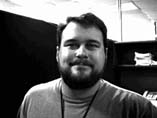


Who I Am
As the project engineer for Mars Surveyor Operations, I am responsible
for making sure that all of the spacecraft we are flying at or to Mars will
meet all of the scientific objectives that we have planned for their missions.
We are currently flying the Mars Global Surveyor mission, already in orbit
at Mars and getting ready to fly the Mars Climate Orbiter and Mars Polar
Lander which will launch in late '98 and early '99, respectively.
My Job
Our project is organized into three main groups: 1) the scientists who are conducting the experiments and designing the cameras and other scientific instruments to survey the planet Mars; 2) the mission planners and navigators, who work to define what trajectory each spacecraft should take to get to Mars, what orbit or landing site each spacecraft should aim for when we get there, and how we plan to operate the spacecraft while there to maximize the scientific data return; and 3) the spacecraft engineers, who operate all the spacecraft on which the instruments are mounted so that they will: supply the required power to the instruments and keep them pointed well enough to collect the required data; provide the propulsion necessary to change or "trim-up" the spacecraft orbit or trajectory as required; provide the radio link required to locate the spacecraft and send remote-control commands up to it; and return pictures, scientific data and engineering telemetry back from the spacecraft.
As the chief project engineer for operations, it is my job to make sure that all of the technical details are worked out and that the flight operations go smoothly so that the science teams can make all of the observations that they want to. This involves making sure that all of the spacecraft are healthy and able to collect and send back their data, that we know exactly where they are so that we can tell both the scientists and the ground antennas exactly where to expect the spacecraft to be at any point in time, and also that we plan what activities the spacecraft needs to perform in the future so that we can build a sequence of commands to control it for the set of observations. While each of these functions are performed by engineers on the various project teams, it is my job to make sure that it all comes together and that the there are no technical "glitches."
Even though I don't usually directly control the spacecraft myself (I let the professional "Ace's" do most of that work), I have had to roll up my sleeves every so often in an emergency, and pitch in as a part-time Ace. Since I do it so rarely (and not as good as the people who do it full-time), they call me a "Deuce" when they give me a chance to "drive" the spacecraft.
What I Like About my Job
I enjoy my job a lot because, in addition to all of the different kinds of technology it exposes me to, it also requires a lot of teamwork. A spacecraft itself (as well as many of the subsystems of which it is made) is so complicated that it is almost impossible for a single person to be able to understand everything that is required to complete the mission. I spend a large part of my time using both technical and communication skills (translating something from one technical specialist into something another specialist can understand). Sometimes, when you realize how complicated someone else's design really is, it can be a very humbling experience!
Influences
I've always been fascinated by the space program. My earliest memories, when I was three or four years old, were of when my parents would let my older sister and me stay up late to watch the Apollo mission launches and landings. Growing up in rural Tennessee, neither of my parents had a technical background (although my father and I loved to build model airplanes), but they really worked hard to instill in my sister and me a love of reading and learning.
My Career Journey
When I left Tennessee to go to college in Boston, I knew that I wanted
to get a job working in the space program. As an undergraduate in college,
I studied both engineering and planetary astronomy. In graduate school,
I specialized in control system engineering. When I look back on which classes
I enjoyed the most and which ones helped prepare for my job, the best ones
were team design projects - where the class as a whole is given a project
to solve. In these classes, one had to realize quickly that the way to get
the best grade is not to compete against the rest of the class, but rather
to cooperate and take advantage of everyone's strengths so that the final
solution is the best possible. These classes also emphasized the most important
skill that any engineer can posses - problem solving. If you are interested
in technology just for its own sake, then you should become a researcher
or a scientist. The mark of a true engineer is someone who can take all
of these neat new tricks of technology and piece them together into something
that someone can use to solve a real-life problem that's facing them.
Personal
After finishing school in Boston, I began work at NASA's Jet Propulsion
Laboratory in Pasadena, California, where I have worked since then. My wife
Anne and I live in Pasadena with our two cats. We met while we were both
in school in Boston and have been married for four years. She works as a
management consultant, helping people figure out what their companies should
be planning to do in the future. Anne and I enjoy biking and running together
(although I cannot run as far as she wishes I could). We also enjoy eating
out at restaurants together (which is the main reason why I can't run so
far!).